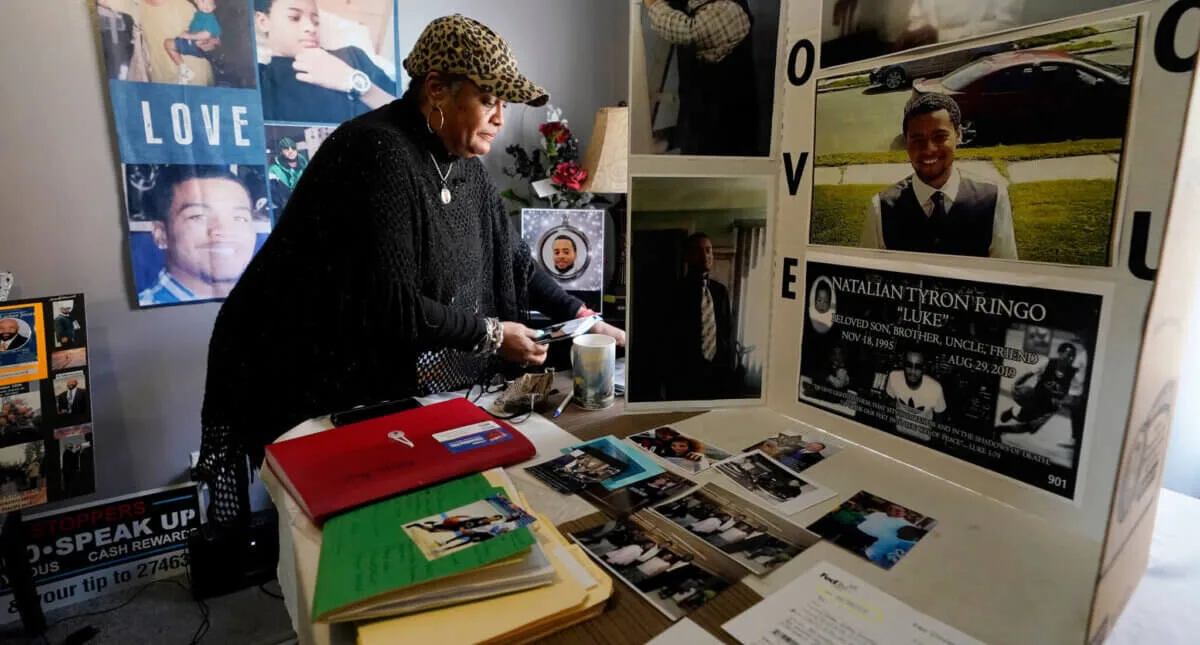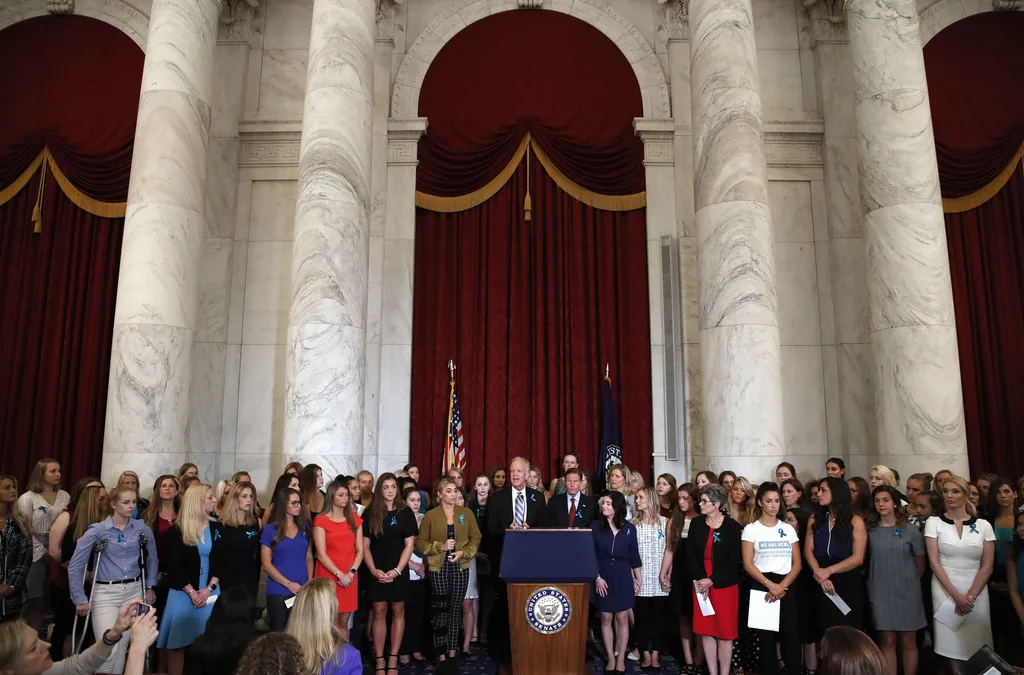
Bernice Ringo looks through photographs of her son Natalian, on Tuesday, March 28, 2023, in Detroit. (AP Photo/Carlos Osorio)
Bipartisan legislation that takes effect this summer will ramp up state funding for survivors of crime—and help heal old wounds.
MICHIGAN— After a lifetime living around Detroit, Bernice “Tammi” Ringo had plans to move to Alabama with her 23-year-old son Natalian to get him away from the crime in the local area.
Those plans were shattered in 2019, when Natalian was fatally shot while sitting in his car.
Ringo applied for funeral and counseling aid through a victim compensation program for victims of violent attacks. She said she was denied because the program said she could rely on life insurance instead. She appealed, and while the program overturned its initial decision, it denied her again, saying her son had committed misconduct tied to his own murder.
The state commission provided no details, Ringo said, and Highland Park police were little help.
Overwhelmed with grief, Ringo, 64, spoke before the state Legislature last year about the trauma of being told her son had somehow caused his own murder.
“They put me through more hell,” she said.
After she and other victims testified, Michigan lawmakers passed legislation—set to take effect in August—that makes several changes to the state’s victim compensation program, including eliminating reporting deadlines, nearly doubling the cap on the cash available to victims from $25,000 to $45,000, and making more people (like caretakers of victims) eligible for benefits.
The new law formally erases an eligibility requirement that mandated crimes be reported to police within 48 hours, which isn’t always possible after a traumatic event. The legislation taking effect this summer will also extend the time to apply after a crime from one year to five years.
Those who were the victims of criminal sexual conduct before the age of 18 currently have to wait until their 19th birthday before they can make a claim in Michigan. The new law will eliminate that requirement, and create an extended 10-year-window with which they can file a claim. Funeral reimbursements for families will also be increased from $5,000 to $8,000.
Across the country, survivors like Ringo are using their stories to advocate for more changes to victim compensation programs, which thousands of survivors turn to for help with medical bills, relocation, funerals, or other expenses. These programs disburse millions of dollars each year, but the Associated Press found racial inequities and other barriers in how claims are denied.
Michigan reportedly tracked nearly 700 applications last year and paid out about $4 million between fiscal years 2018 and 2022. Only about 23% of white applicants in Michigan were reportedly denied compensation for behavior reasons, compared to 54% of Black applicants.
Hundreds of survivors and their families gathered in Lansing last month to urge lawmakers to continue ramping up funding for the compensation program.

“It’s time we build upon our progress to meet the needs of survivors and improve safety in every community,” said rally organizer Priscilla Bordayo. “Survivors should never fear losing their homes or jobs after they’ve just become victimized or lost a loved one.”
Bordayo’s group is specifically pushing for new legislation in Michigan that would help crime victims with the financial support needed to move to a more stable home for safety, and expand employment protections so they can use paid leave to take time off work to recover.
No bills have been introduced this year to make changes to the victim compensation program, or to add additional housing or employment protections for survivors, but lawmakers—like state Rep. Tyrone Carter (D-Detroit)—promised to take action at the recent rally at the Capitol.
“Combating crime also means ending cycles of victimization,” Carter said. “That’s why I’m sponsoring the Safer Michigan Act, and fighting every step of the way to make our state safer.”
READ MORE: Hundreds Rally for New Bills That Can Help Both Victims and Inmates
Legislatures in other states have also passed similar reforms in recent years, at the behest of crime survivors.
The changes vary: A victim’s criminal history is no longer an automatic disqualifier in Illinois. The time limit to apply for help was increased from three to seven years in California. States have also cut back on their denials to families based on the behavior of victims and loosened requirements that victims must have cooperated with or reported the crime to police.
In Ohio, for example, denials are no longer automatic for crime victims who have felony convictions, or for surviving family if a murder victim had drugs in their system. Those reasons were used to deny help for a handful of victims in the 2019 mass shooting at a Dayton bar.
Lenore Anderson, president and co-founder of the Alliance for Safety and Justice, which organizes victims to advocate for criminal justice reforms, has pushed program administrators for years to shift their focus from eligibility requirements to victim needs.
“It feels so obvious that the very least we can do when someone is hurt by crime and violence is ask, ‘What do you need?’ And the fact that that is completely counter to how these bureaucratic systems operate is shocking,” she said.
Data is not available for the handful of states that passed recent sweeping reforms. But New Jersey, which overhauled its program rules in 2020, saw an immediate change. In 2018 and 2019, Black victims accounted for about 44% of applications but received nearly 60% of the denials, data shows. After the overhaul, that disparity dwindled, and by 2021 it had disappeared.
Anderson said also she’s seen signs of change at the federal level, where the Justice Department’s US Office for Victims of Crime provides state programs with matching dollars that are tied to some regulations and a set of suggested guidelines. In a 2021 memo to state programs, the office encouraged states to add exceptions to police cooperation requirements.
The office is in the process of overhauling compensation guidelines for the first time since 2001.
‘Gander Political Correspondent Kyle Kaminski contributed to this report.
Politics

VIDEO: How Michigan public schools survived the pandemic
https://www.tiktok.com/@gandernewsroom/video/7357799499571531050

What to know about Trump’s legal issues
Over the past year, former president Donald Trump has become the center of not one, not two, not three, but four criminal investigations, at both...

Michigan lawmakers look to break (another) state funding record for public schools
Democratic lawmakers are hashing out plans to bring state funding for Michigan’s public schools to another new, all-time high—and ensure teachers...
Local News

Lawyers for Nassar assault survivors have reached $100M deal with Justice Department, AP source says
The US Justice Department has agreed to pay approximately $100 million to settle claims with about 100 people who say they were sexually assaulted...

More Michigan teens could soon take driver’s ed in their own schools
Privatization of driver’s education means that only 38 Michigan high schools offer affordable in-school driving classes for students. New grants...





